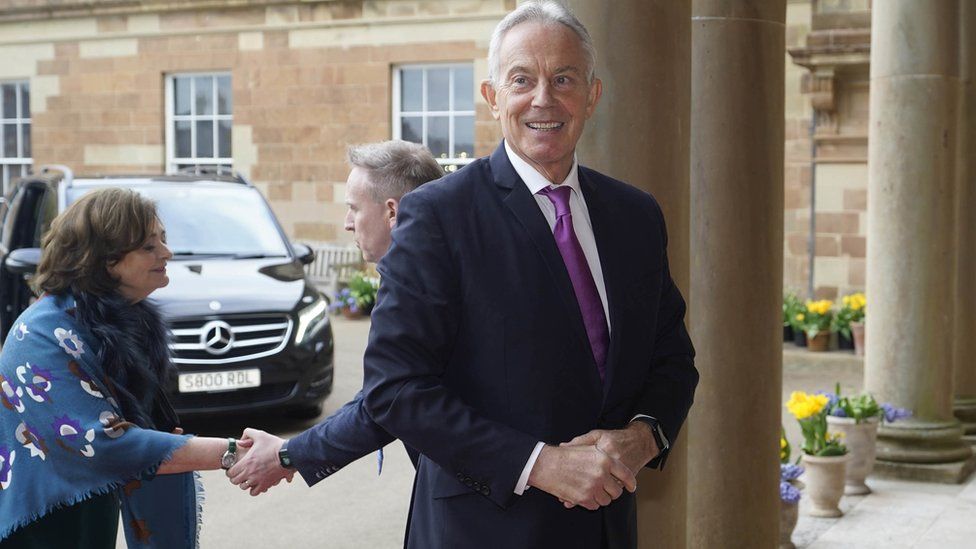ARTICLE AD BOX
 Image source, PA Media
Image source, PA Media
Sir Tony Blair is in Northern Ireland to mark the 25th anniversary of the Good Friday Agreement
The institutions of the Good Friday Agreement need to be continually worked at to secure them for the future, Sir Tony Blair has said.
The former prime minister is in Belfast for a conference marking 25 years since the historic peace deal.
"There has been a huge amount of gain and there are people alive today who otherwise wouldn't be," Sir Tony said.
The three-day conference will host many global faces, including Bill and Hillary Clinton.
The peace accord was designed to bring an end to 30 years of conflict in Northern Ireland, the Troubles.
It was signed by Sir Tony and his Irish counterpart at the time, Taoiseach (Irish prime minister) Bertie Ahern.
Mr Ahern told the BBC that barriers were broken down to secure the peace deal in 1998.
"We had the right mix of people and because we were at it night and day for eight or nine months, if not for a number of years before that," he told BBC Good Morning Ulster.
Sir Tony Blair said the personal relationship he had with Mr Ahern helped them get "over old sores" that the British and Irish governments faced.
"We were both in the European Union together," he said.
"All of that was very important in making sure that when we hit a roadblock there was a massive collected desire to make sure that we removed it."
The settlement established power-sharing institutions at Stormont that involved nationalists and unionists governing Northern Ireland together.
'Back into business'
The conference from 17 to 19 April features speeches and panel discussions from former and current political leaders.
It is being held at a time when Northern Ireland is without a power-sharing government.
Its second-largest party, the Democratic Unionist Party (DUP), collapsed the Stormont executive in February 2022 over its opposition to the trade arrangements for Northern Ireland that resulted from the original Brexit deal between the UK and the EU.
On Sunday, Hillary Clinton, the former US Secretary of State and the current chancellor of Queen's University Belfast, urged political parties in Northern Ireland to return to power sharing.
Asked about the future of Northern Ireland, she said: "Part of what I hope happens is that people from every part of the political system here will decide that the government needs to get back into business."
Analysis: Mark Simpson, BBC News NI correspondent
The Belfast conference is bringing politicians together in a way that was not possible 25 years ago.
All the main parties in Northern Ireland will be under the same roof at the same time.
A quarter of a century ago, when Sinn Féin walked into the Stormont negotiations, the Democratic Unionist Party (DUP) walked out.
It took another decade for relations to normalise, or become as normal as things get in Northern Ireland politics.
The stop-start nature of power-sharing since Good Friday 1998 shows that the deal was not perfect, to say the least.
All things considered, there is a lot to discuss at the conference. The organisers are hoping the focus will be on solutions rather than the problems.
The Clintons have frequently reiterated their support for the peace process, with Bill Clinton making three trips to Northern Ireland during his presidency.
Prof Ian Greer, vice-chancellor of Queen's University, said this week's conference offered the "opportunity to reflect upon and recognise the achievements of 25 years ago".
He said the agreement had "led to significant progress in Northern Ireland, delivering greater prosperity and a safer and more inclusive society".
"We also want to look forward to how we address the major issues impacting society today so we can build on the current peace over the next 25 years."
What is the Good Friday Agreement?
The prime minister at the time, Tony Blair, and then Taoiseach (Irish Prime Minister) Bertie Ahern sign the Good Friday Agreement
Also known as the Belfast Agreement, it was a political deal designed to bring an end to 30 years of violent conflict known as the Troubles.
Signed on 10 April 1998 and approved by public votes in Northern Ireland and the Republic of Ireland, it is based on the idea of co-operation between communities.
It helped to set up a new government for Northern Ireland, representing both nationalists and unionists.
Last week US President Joe Biden visited the island of Ireland over four days to mark the 25th anniversary of the agreement.
He hailed the "tremendous progress" since the deal was signed, adding that Northern Ireland had been "transformed by peace; made technicolour by peace; made whole by peace".
Prime Minister Rishi Sunak will also be in Northern Ireland this week, to pay tribute to the contribution young people have made to peace.
Among those events will be a gala dinner to honour those who signed the deal.
Read more about the agreement
Mr Sunak said he was due to meet some of the leading architects behind the peace agreement.
He will acknowledge their "courage, imagination and perseverance" when he gives the closing speech at the conference.
Senator George Mitchell received a standing ovation from theatre-goers in Belfast
On Sunday afternoon, former US Senator George Mitchell, who chaired the talks that led to the 1998 peace deal, attended a performance of a play about the agreement at the Lyric Theatre and received a standing ovation from the audience as he took his seat.
Declan Harvey and Tara Mills explore the text of the Good Friday Agreement, scrutinising the deal's wording and hearing from some of the people who helped get it across the line.
Click here to listen on BBC Sounds.

 1 year ago
24
1 year ago
24








 English (US) ·
English (US) ·